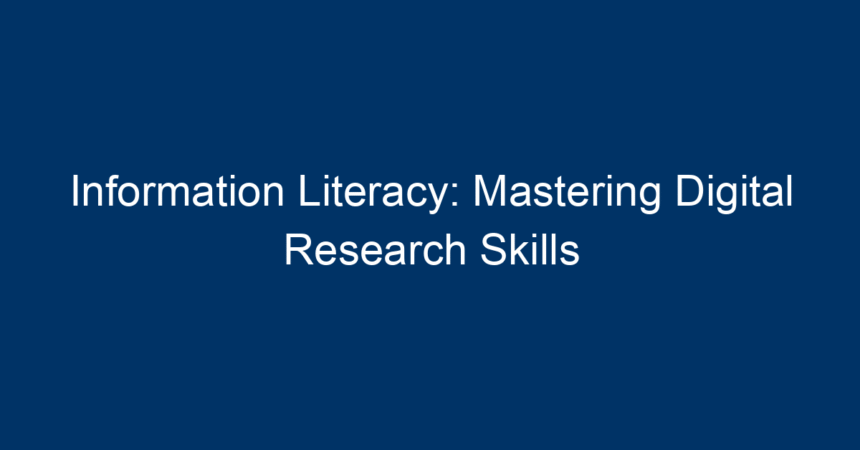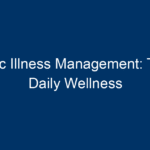In today’s digital age, the ability to navigate the vast ocean of information is more critical than ever. From online databases to social media, the internet is a treasure trove of data waiting to be explored. However, not all information is created equal. This is where information literacy comes into play. In this article, we will delve into what information literacy entails, why it is essential, and how you can master digital research skills to become an effective information consumer and producer.
What is Information Literacy?
Information literacy is the ability to recognize when information is needed and to locate, evaluate, and effectively use that information. It encompasses a range of skills, including finding credible sources, understanding how information is generated, and synthesizing data into actionable insights. Given the rapid expansion of online content, honing your information literacy skills is not just advisable; it’s imperative.
The Importance of Information Literacy
-
Decision-Making: Whether you are a student, a professional, or merely someone seeking to make informed choices, being information literate enables you to make decisions based on credible data rather than misinformation.
-
Critical Thinking: Information literacy fosters critical thinking. You learn to question the validity of sources, assess biases, and differentiate between fact and opinion.
-
Academic Success: For students, information literacy is crucial for research projects and presentations. Understanding how to gather and cite information correctly can significantly impact academic performance.
- Career Advancement: In the workplace, employees who possess strong information literacy skills are more capable of conducting effective research, making data-driven decisions, and contributing to innovation.
Key Components of Information Literacy
To effectively develop your information literacy, it’s essential to understand its core components. Here are the primary skills that contribute to becoming information literate.
1. Identifying Information Needs
The first step in mastering information literacy is recognizing your information needs. What specific data or insights are you looking for? Crafting clearly defined questions will set the stage for effective research. This skill involves:
- Understanding the problem at hand
- Defining the types of information needed
- Taking into account the context of your research
2. Conducting Effective Research
Once you’ve identified your needs, it’s time to delve into the research process. Here are some strategies to enhance your research skills:
a. Choosing the Right Search Tools
Different search engines and databases serve different purposes. Familiarize yourself with academic databases like JSTOR or Google Scholar for scholarly articles, while platforms like Google or Bing can help with general web searches.
b. Using Advanced Search Techniques
Utilizing advanced search functions can significantly improve the quality of your search results. Use quotation marks for exact phrases, plus (+) for inclusive terms, and minus (-) to exclude certain keywords.
c. Evaluating Sources
Not all information is reliable. When evaluating sources, consider the following criteria:
- Authorship: Who created the content? Are they credible in the field?
- Publication Date: Is the information current and relevant?
- Citations: Does the source reference reliable data?
3. Analyzing and Synthesizing Information
Once you have amassed data, the next step is to analyze it critically. This involves:
- Identifying patterns and themes
- Comparing and contrasting different viewpoints
- Synthesizing information to form a cohesive understanding
Being able to draw connections between various pieces of information is a hallmark of a proficient researcher.
4. Ethical Use of Information
As you master information literacy, it’s crucial to understand the ethical implications of using information. This includes:
-
Citing Sources: Always give credit where credit is due. Familiarize yourself with different citation styles (APA, MLA, Chicago) depending on your field.
- Avoiding Plagiarism: Ensure that you paraphrase correctly and contribute your unique insights when synthesizing information from various sources.
Strategies for Improving Information Literacy Skills
Now that we’ve explored the components of information literacy, here are actionable strategies to enhance your skills:
1. Engaging in Online Workshops
Many libraries and educational institutions offer free workshops on information literacy. These have practical exercises to help you hone your skills.
2. Utilizing Online Tools and Resources
Several platforms provide excellent resources for improving your research skills:
- Khan Academy: Offers video tutorials on various research-related topics.
- Coursera and edX: Host courses on information literacy led by top universities.
3. Practicing Regularly
Like any skill, practice is key. Regularly engage in research projects, whether academic or personal. Challenge yourself with diverse topics to broaden your skills.
4. Networking with Information Professionals
Consider connecting with librarians and information researchers. Engaging in conversations about their methods and tools can provide invaluable insights into making the most of available resources.
The Role of Information Literacy in a Digital Era
As technology evolves, so does the landscape of information. With the rise of social media and content-sharing platforms, information literacy has become a vital skill for navigating this new terrain. Understanding how algorithms prioritize information can help you discern credible sources from misinformation.
Moreover, the recent proliferation of artificial intelligence tools has transformed how we interact with data. Information literacy allows you to discern the quality and accuracy of AI-generated information, ensuring you make informed choices.
Conclusion: Take Charge of Your Information Journey
Mastering information literacy in the digital age is not just about acquiring research skills; it is about fostering a mindset of inquiry and skepticism. With the right tools and strategies, anyone can develop these essential skills.
Remember, being information literate opens doors to a world of knowledge. As you embark on your journey to master digital research skills, take actionable steps to improve your abilities consistently. Whether through workshops, online resources, or regular practice, the effort you put into enhancing your information literacy will pay dividends in every area of your life — academically, professionally, and personally.
Embrace the digital world with confidence, equipped with the skills to navigate it wisely and responsibly. The future of information access and utilization starts with you.




